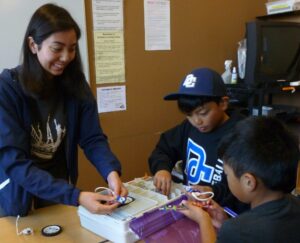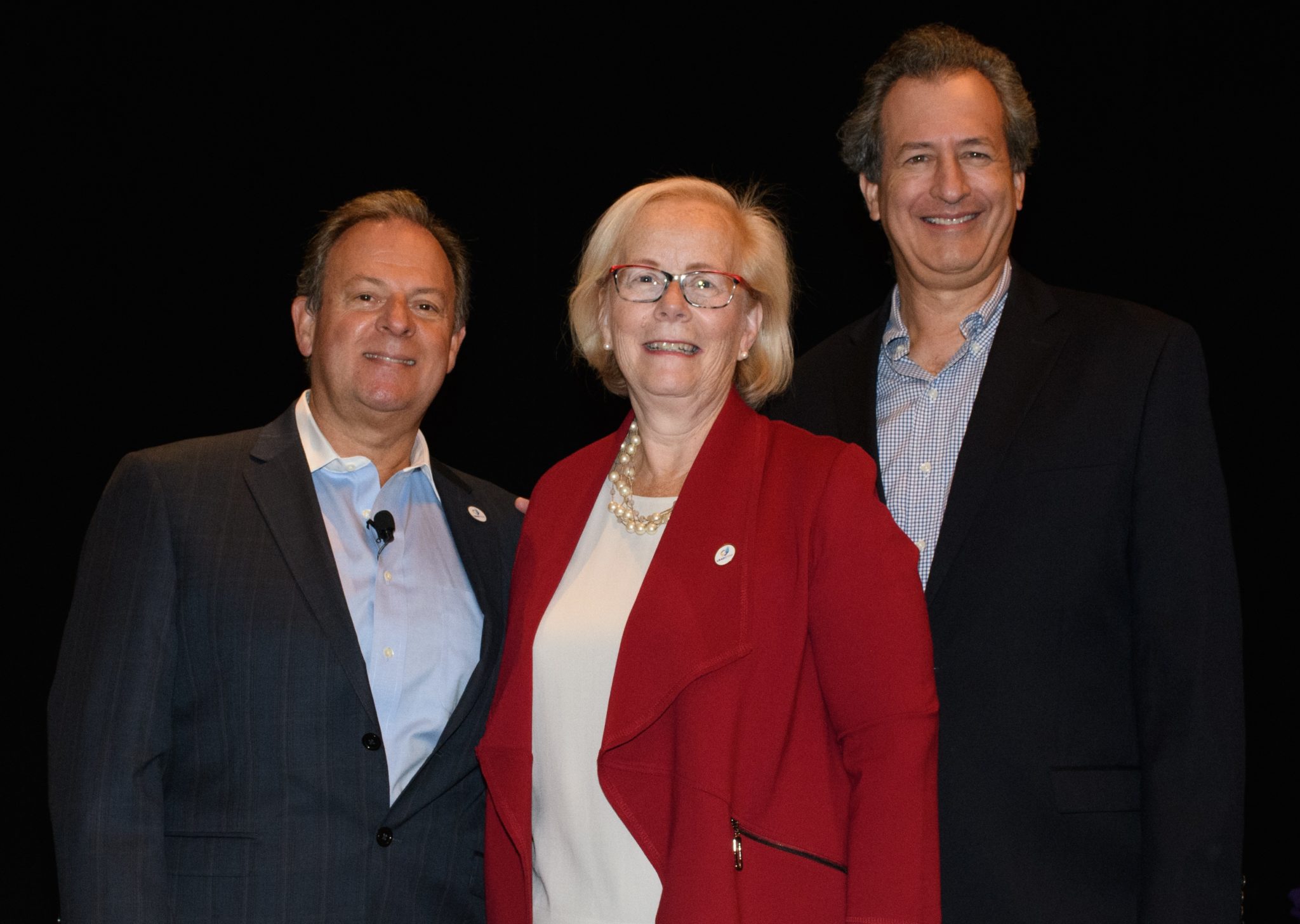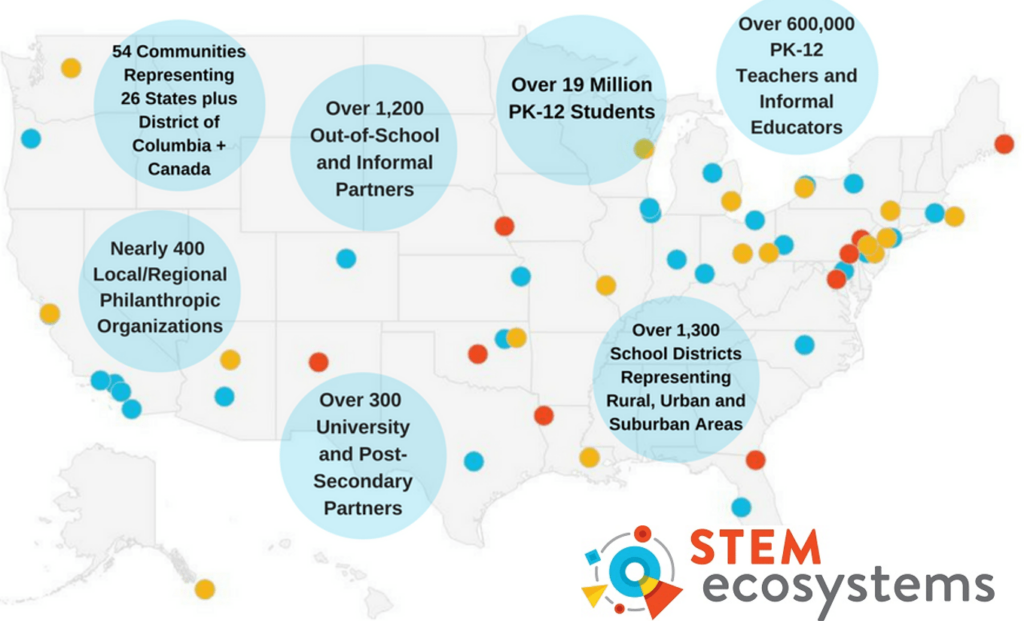As the calendar turns over and a new year begins, like many of you, we’re envisioning new plans and successes. It’s also a good time to look back and evaluate where we’ve been. This month, instead of spotlighting a single Ecosystem, we’d like to share the broad perspective of the entire STEM Learning Ecosystems Initiative.

The driving principle behind the STEM Learning Ecosystems is that every young person should have access to a rich ecosystem of connected learning opportunities, in and out-of-school. We started in 2015 with 35 STEM Ecosystems focused on building regional networks for STEM education. Gathering varied partners from a community to work together to improve a specific aspect of education is a seemingly simple idea, but it takes significant effort to identify willing organizations and the hands-on collaborators and contributors at each. With expert coaching from TIES, local Ecosystems are building regional hubs for STEM education.
As the Initiative grows, we’ve not only added more Ecosystems, we’ve also fostered a thriving Community of Practice where ideas are tested and shared from Ecosystem to Ecosystem (E2E, we call it). This rich exchange of practical information benefits students who are interested in STEM disciplines and builds a well-prepared workforce that is equipped for the evolving job market.
Here’s a snapshot:
As we move into 2018, we’re providing even more opportunities to strengthen community-based STEM education.
Show me the money! Mini-grants will be offered to selected Ecosystem communities to offset travel expenses and facilitate collaboration between distant groups.
Leverage online learning from peers Monthly E2E conversations will be held as webinars with Q&A time. Topics will be suggested and curated by members of the Community of Practice, and the expert Technical Assistance team from TIES will facilitate. Discussions will be differentiated by category, for example, sometimes divided by rural / small urban / urban demographics, sometimes by workplace roles such as district administrator / corporate partner and mentor / science center leader.
See you in Austin… STEM Ecosystems leaders have been selected to present the Ecosystem model with SXSW EDU attendees this spring! SXSW EDU is known for empowering stakeholders to advance teaching and learning with the latest ideas and technologies. The panel discussion, Not “Random Acts of STEM”: Planned Career Success, will feature Gerald Solomon, Co-Founder of STEM Learning Ecosystems; Gregory Washington, Dean of the Henry Samueli School of Engineering at UC Irvine; and Parminder Jassal, Institute for the Future. These leaders will share examples to demonstrate that any community, regardless of size or challenge, can build a successful STEM ecosystem to reframe how students learn, how teachers teach, and how workforce pipelines with STEM-skilled individuals can be built and sustained. We’re honored that we’ve been selected to share lessons learned from developing and successfully implementing the Ecosystem model.
If you’re attending SXSW EDU, plan ahead to attend this discussion on Monday, March 5, 2018 at 2:30 pm in Salon F of the Hilton Austin Downtown (verify location when the final schedule is published).
If not Austin, Washington DC? Twice yearly, members of the Community of Practice benefit from in-depth learning at in-person Convenings.
Here are highlights from Fall 2017:
On April 4-6, 2018, we’re teaming up with US News to host a joint conference. Our members will attend sessions with content developed specifically for application in the Ecosystem environment. They will also be able to fully participate in U.S. News & World Report STEM Solutions Presents: Workforce of Tomorrow. This conference gathers leaders across multiple industries – many of whom are Ecosystem leaders – to discuss key insights, innovative strategies, and industry best practices to develop a workforce skilled in science, technology, engineering and math. STEM Ecosystems members will be able to gain different aspects of knowledge at both events and network with large groups of relevant contacts from a wide variety of backgrounds.
Feeling left out? This year, the number and diversity of Ecosystems will continue to grow. If your community has taken steps to establish cross-sector collaborations to better educate and equip youth for STEM careers but is not yet part of the STEM Learning Ecosystems Initiative, learn more about the process here.
STEM Learning Ecosystems are making a huge impact in a short period of time. Learn about the leadership of the organization in these profiles: Gerald Solomon, Co-Founder; Ron Ottinger, Co-Founder; and Jan Morrison, Executive Director of TIES.

These are just some of the exciting plans we have for STEM Ecosystems in the first half of 2018. Be sure to follow us on Twitter and LinkedIn for ongoing news about the Ecosystems, STEM education, and workforce development.


